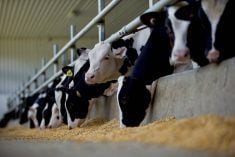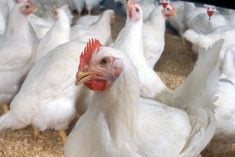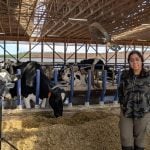Tests checking for the presence of porcine epidemic diarrhea (PED) show another virus causing diarrhea in hogs has now made its way into Canada, again in Ontario.
Ontario’s Animal Health Laboratory (AHL) on March 14 confirmed swine deltacoronavirus (SDCV) in samples from six hog farms, the provincial ag ministry said Tuesday in a release.
SDCV was detected in follow-up tests on hog operations where animals were showing “clinical signs” of vomiting and diarrhea, but had tested negative for both the PED virus (PEDv) and transmissible gastroenteritis (TGE) virus, the province said.
Read Also

U.S. livestock: Cattle futures drop on Trump call for lower prices
Cattle futures on the Chicago Mercantile Exchange dropped sharply on Wednesday, reacting to comments from United States President Donald Trump…
Tests at the AHL and at Iowa State University also found samples of porcine plasma — taken from the same batch of the piglet feed ingredient that tested positive for PEDv in February — were positive for SDCV, the province said.
The positives are “the first confirmed cases of SDCV in Canada,” the province said.
Testing for SDCV is available free of charge in Ontario for herds showing symptoms, the province noted.
Like PEDv and TGE, SDCV causes diarrhea and vomiting in all age groups of pigs and causes mortalities among nursing pigs, albeit at lower mortality rates than seen with PEDv.
SDCV, like PEDv, is also not considered a health risk for people or other animals, nor is it considered a risk to food safety.
SDCV, according to the province, was first detected in pigs in Hong Kong in 2012 and was detected in hog manure at four farms in Ohio in February this year. [Related story]
The four Ohio farms had pigs showing clinical signs similar to PED — and three of those farms had also tested positive for PED, the province noted.
“With technological advances, new types of viruses are detected on a regular basis,” the province said in its release Tuesday. “Numerous” coronaviruses exist that can cause infections in humans and other animals, thus it’s “not surprising” to find an additional one in hogs.
SDCV can be prevented and managed, the province said, through “vigilance and strong biosecurity” on-farm, cleaning and disinfection by transporters, renderers, processors and other service providers, and developing herd immunity to reduce clinical signs.
Veterinarians are required to “immediately” report any findings that identify a serious risk to animal health — SDCV included, the province added.
Ontario was also the first Canadian province to confirm cases of PED, starting in January. As of Wednesday, PEDv has been confirmed on 35 hog farms in the province and one each in Manitoba, Quebec and Prince Edward Island. — AGCanada.com Network















